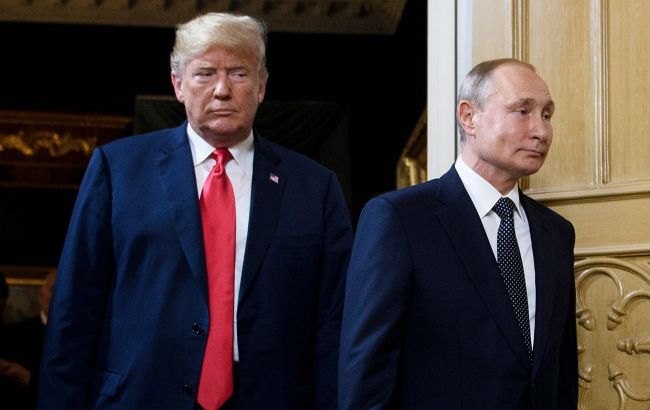Putin didn't outplay Trump on Ukraine, he gave him Iran
 Putin is ready to make many concessions to Trump (photo: GettyImages)
Putin is ready to make many concessions to Trump (photo: GettyImages)
What are Trump and Putin agreeing on, is Russia ready for a ceasefire, what is the actual US position on the Russian-Ukrainian war, and where did the White House get the pro-Russian narratives from - political analyst Abbas Galliamov told RBC-Ukraine.
On the results of the delegations' meetings in Riyadh
Given the lack of positive comments on the results of the meetings in Riyadh, the parties did not come to anything substantial. But in principle, nothing bad happened either - Trump, relatively speaking, did not give up Ukraine to Russia, because theoretically it could have happened. So this is the result. Consultations and meetings will continue, as all parties have stated.
Moreover, the range of topics discussed, particularly between the United States and Russia, is very broad. It covers far more than just Ukraine. Let me remind you that following the first round of telephone conversations between Putin and Trump, they partially agreed on their position on, for example, the Iranian nuclear program. Russia, to a certain extent (based on the small amount of public information available), supported Trump's position on Iran.
And in this sense, it cannot be said that Putin outplayed Trump because he did not agree to a complete ceasefire, but only to a small truce on energy. Rather, he paid off Trump - to put it simply, he gave him Iran.
Russia seems to have pissed off Iran
The White House statement following the conversation emphasized that both presidents agreed that Iran should not be able to destroy Israel. We are talking about nuclear weapons. That is, for the first time since the beginning of the war, Russia has confirmed that Iran should not possess nuclear weapons. Putin also said that the problem of Iran's nuclear program should be resolved at the negotiating table. This is exactly what Trump wants and what the Ayatollahs don't want - their position is that they are not even going to negotiate.
Therefore, it is difficult for us to assess what is happening, because the subject of negotiations between the US and Russia is not only the Russian-Ukrainian war. I believe that in addition to the Iranian issue, they are also discussing Russia's relations with China and North Korea, Russia's position in Africa and Latin America, Russia's position in OPEC, business, particularly in the Arctic, gas, oil, and the extraction of titanium, gold, and rare earths.
But for Putin, Ukraine is of fundamental importance among all these issues - everything else is secondary. After all, he could have withdrawn some troops from Donbas, pausing his offensive there to keep the Assad regime in Syria. But he did not do so. While for Trump, the war in Ukraine is one of the problems, it is significant, but not number one.
It is safe to say that for Putin, all other projects and issues are just a bargaining chip. He is ready to exchange them without any problems for Trump's more accommodating position on Ukraine. And during the last phone call between them, this is partly what happened. Trump could have taken a different position: if he didn't agree to a complete truce, he would have received a new round of sanctions and increased arms supplies to Ukraine, up to and including Tomahawk missiles. However, he did not do this. He was satisfied with the changes in Russia's position on the issue of Iran's nuclear program.
Is there a risk that the United States may accept all of Russia's conditions regarding Ukraine?
There are certain indicators that the situation may develop in this way. For example, Trump and people around him have begun to reproduce Russian propaganda narratives that Ukraine is on the verge of defeat, that Russia has allegedly surrounded Ukrainian troops in the Kursk region. Many people took this as if the Americans were fools to believe the Russians.
But they are not stupid. I am afraid that this is a conscious, cynical choice. They are internally ready to drain Ukraine to some extent. That is, they are ready to make concessions to Putin on the issue of Ukraine in exchange for his position on a number of other issues - the Middle East, business interests, etc. However, public opinion hinders the Trump team from making these concessions.
American public opinion is clearly on the side of Ukraine, as evidenced by many polls conducted in the United States. Most importantly, most Americans do not believe that Ukraine will lose. Under these conditions, if the new US ruling team starts handing Ukraine over to Russia, their citizens will not understand them.
But if the picture for the American audience looks different - that Ukraine is almost a loser, and Russia is going to finish it off - then Trump's actions will be perceived differently. Then Trump allegedly intervened in this war with the position of letting Ukraine do anything and give up everything, but the war will end, and Putin will not finish you off. With such a presentation, he will look even normal to the Americans.
I think that the reproduction of Russian narratives that they will soon have a victory may be preparing American public opinion for concessions to Russia. I also think that Ukraine's operation in the Belgorod region, which has recently begun, is just an attempt to counter these narratives. Zelenskyy cannot argue with Trump because he is offended. But Americans read the news, and they see that Ukraine has launched a counteroffensive, attacking Russian territory. After that, Witkoff's assertion that the Ukrainians are already in a deep knockdown doesn't look so convincing anymore.
In other words, Trump's possibilities for giving up Ukraine's position are not unlimited. Trump is still running a democratic country, after all. Public opinion still matters there. At the same time, however, it should be understood that Americans are not that interested in foreign policy issues, particularly the war in Ukraine, and they do not follow it very closely. Therefore, we should not be sure that he will not give up Ukraine's position in any way.
Public opinion within the United States is a very important factor, but not the only one. European opinion also plays a role. Although the current American leadership does not show as much respect for European opinion as the previous administration did. But this is not to say that the White House does not care about its position at all. Europe is a powerful player, and it would be unwise to quarrel with it out of the blue. And the Americans themselves are unlikely to like it.
There is a third factor: the position of Ukraine itself. If Kyiv is not satisfied with the conditions to which it is being pushed, it will also be able to object to Trump. It may be difficult, but both Trump and Putin should have this possibility in mind. Because at the beginning of this war, Ukraine organized resistance, even though the initial US position was that Kyiv would fall in three days. And Ukraine itself decided that it would resist despite the odds. Moreover, the tough stance of Ukrainians and Ukraine is an argument not only against Trump, but also an argument that he can use against Putin.
Is Putin ready for a ceasefire?
I think that Putin is internally ready to give up everything to Trump. He will not dare to quarrel with Trump, because he at least gets from him Ukraine's nonaccession to NATO. After all, according to Putin, this is why the war began in the first place. Therefore, it would be the height of stupidity for him to quarrel with the American President now if he demands something from him. Trump could respond by launching the procedure for Ukraine's accession to NATO. For Putin, this would be a disaster.
Russia cannot develop its territory, Siberia is empty, and the Far East is being taken over by the Chinese. So, fighting for the extra few thousand square kilometers of destroyed territory means quarreling with the American President, who was ready to abandon the idea of NATO expansion. That would be a strategic defeat for Putin, so I think he won't do it.
Putin is trying to confront Trump, trying to buy him, to seduce him with concessions, both political, for example, on Iran, and economic, for example, participation in the sale of Russian gas to Europe through Nord Stream.
Of course, there are temptations that Putin is giving Trump. However, Trump wants a ceasefire - he promised it to everyone. Secondly, both Ukraine and Russia are exhausted; their economies, armies, and populations are exhausted - this is an objective component of the process that must not be forgotten. No one can win by military means. In this situation, a ceasefire and the transfer of the conflict from military to diplomatic tracks seems quite logical.
So far, these negotiations are an ongoing dialogue and bargaining, using all the arguments that can be found. That is why it is still impossible to predict their outcome, because history has not yet been written. It is only being written right here and now.

